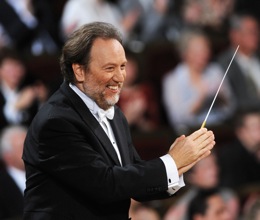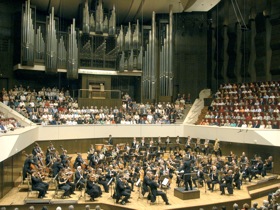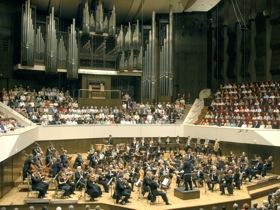His return to San Francisco will come 33 years after his participation in a historic event that took place in the War Memorial Opera House:
- The first time Luciano Pavarotti sang “Nessun dorma” on stage, in his role debut as Calaf
- Montserrat Caballé’s debut in the title role of Turandot
- And Chailly’s own conducting debut here, at age 24

It is a great pleasure to return to San Francisco for the first time. I am coming back still with a fresh memory of the Turandot production I conducted as a young fellow, with Pavarotti and Caballé making sensational role debuts in the Jean-Pierre Ponnelle production.The focus on the night of Oct. 29, 1977, was on those great singers and the artistic-social hubbub in and around the Opera House, and only partially on the man in the orchestra pit.
Yet there he was: a wunderkind leading a triumphant performance, the same age as Gustavo Dudamel when the Venezuelan first conducted at the BBC Proms, as a replacement for the indisposed Neeme Järvi; and a year younger than Leonard Bernstein when he substituted for Bruno Walter to lead the New York Philharmonic.

Milano-born Chailly, a precocious conservatory student, was a teenage assistant to Claudio Abbado at La Scala and played drums in a rhythm-and-blues band. He went on to lead the Royal Concertgebouw Orchestra for two decades, and to conduct major orchestras and at opera houses around the world.
While Chailly hasn’t been back to San Francisco, the Gewandhaus Orchestra has returned several times during its 33-year touring history, with 229 concerts in the U.S. alone. In Davies Hall, Gewandhaus concerts were led by a familiar figure. San Francisco Symphony Conductor Laureate Herbert Blomstedt, music director here 1985-1995, headed the Gewandhaus from 1998 through 2005. Chailly took over from him as Gewandhauskapellmeister in 2005.
Even now, in Davies Hall, Blomstedt will overlap with Chailly and the Gewandhaus, conducting SFS Feb. 18-20, in works by Haydn and Beethoven.
Blomstedt’s tenure here and in Leipzig were characterized by rigorous adherence to the classics. His successor will follow suit: Before the all-Beethoven concert on Feb. 22 (Piano Concerto No. 5 and Symphony No. 7), the Sunday, Feb. 21, lineup consists of Chopin’s Piano Concerto No. 1 and Dvořák’s Symphony No. 9. (Louis Lortie replaces the originally scheduled Nelson Freire as the pianist on both evenings.)
Why the lack of variety? Chailly’s response:
It was obvious to focus on the core repertoire with which the orchestra has forged its reputation. We bring to California composers who had a personal relationship with the LGO in its lifetime.As to that “personal relationship,” Gewandhaus — which calls itself the world’s oldest orchestra — was first formed in 1743, and Beethoven (1770-1827) himself touredDuring recent years, I have concentrated in Leipzig intensively on composers like Bach, Beethoven, Mendelssohn, Schumann, and Brahms. It was inevitable that we’ll come to the U.S. with composers who have been identified with the Gewandhaus and its tradition.

(1781)
But, pressing on with the question about the strictly 19th-century programming, aren’t there any calls for more variety? Chailly’s answer is that, besides the orchestra’s own preference, it’s also a matter of local requests. He says, somewhat surprisingly in pointing the finger at local organizations:
We gave a variety of programs to our management in New York and they — as always — dealt with the local promoters who invited us. In those programs of course was present more than one composition of the masters of the 20th-century period. But this time the choice focused on our core repertoire of the LGO.Exactly the same programs are scheduled in Los Angeles, Boston, New York, and elsewhere. Apparently, nobody asked for more-current works or, at least, the music of LGO’s most famous music director, Mendelssohn.
Meanwhile, back in Leipzig, the LGO commissioned five works for the current season, in addition to presenting six world premieres. That’s well beyond “the core.”
Finally, back to the 1977 Turandot and Chailly’s initial career, which was primarily in opera, does he plan (with or without the Gewandhaus) to lead opera productions soon? The answer is no, though “There are talks with major European festivals about future possibilities.”

